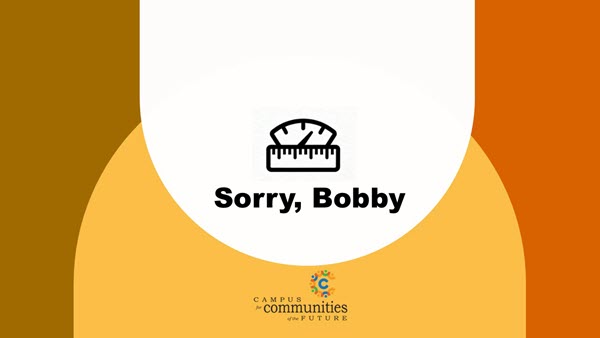Sorry, Bobby

Truth be told, getting me to care as much as I do about outcomes and measurement has been a full-contact sport.
There’s been some kicking, some screaming, and probably a few eye rolls along the way. But here I am—finally that person who gets way too excited about data dashboards and community indicators. Growth, right?
My enthusiasm comes from one simple (and slightly frustrating) realization: we’re not measuring what really matters in our communities. We obsess over economic growth like it’s the only scoreboard that counts—meanwhile, our actual quality of life often sits on the bench, waiting to be noticed.
Here’s the thing: what gets measured matters.
The numbers we track shape public policy, investment, and the stories we tell about progress. And historically, we’ve tracked… let’s be honest, the wrong stuff.
Even though researchers are working hard to create better measurement tools—something that actually balances economic, social, and environmental well-being—there’s still no universal agreement on what that looks like. So, we keep leaning on GDP (Gross Domestic Product), that crusty old statistic that counts everything bought and sold, without asking why or who benefits.
GDP can rise whether we’re building libraries or cleaning up oil spills—it doesn’t care. If your town builds a community centre and another one burns down, GDP applauds either way. Not exactly the moral compass you want guiding society.
The late Robert F. Kennedy warned us about this over fifty years ago. He argued that GDP measures everything “except that which makes life worthwhile.”
And yet… here we are, still using it as our progress report card. Sorry, Bobby.
So, what do we do while the experts hash out a better system?
Maybe it starts close to home—with communities redefining what “success” looks like.
Imagine if we clarified our values and measured things like future-focused leadership, engaged citizens, or whether community initiatives actually make life better (wild idea, I know).
And what if we measured things like access to education, health care, food, jobs, housing, transportation, and safety? What if we cared as much about joy, belonging, and purpose as we do about quarterly returns?
If we start measuring what we value—instead of just valuing what we measure—our decisions begin to change. And who knows? Maybe we’ll finally stop mistaking busyness for progress.
Posted on 10-16-25Next entry: Cars or Care? Time to Turbocharge Differently?
Previous entry: Will They Wrap Their Arms Around New Knowledge?

 Brenda Herchmer is the owner of Grassroots Enterprises, a community development consulting company.
Brenda Herchmer is the owner of Grassroots Enterprises, a community development consulting company.